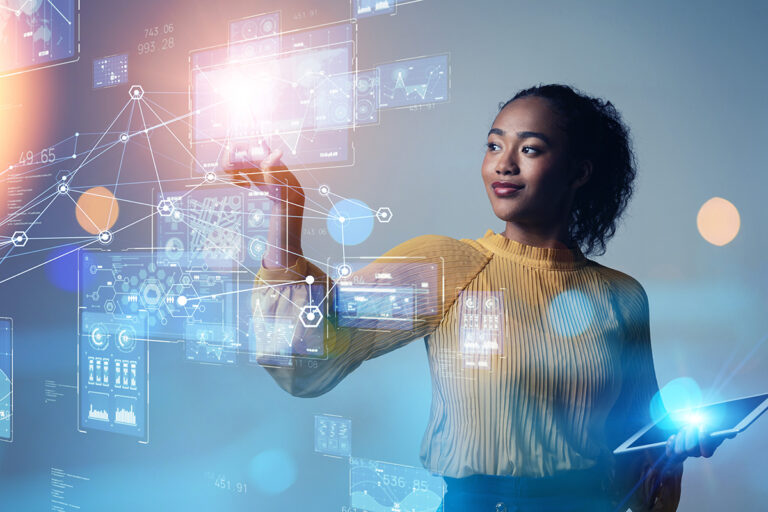Technological advancements have always had a major impact on the way humans work.
Steam power ignited the first Industrial Revolution, moving workers from fields into factories. The second Industrial Revolution, powered by electricity, ushered in assembly lines and mass production. The third was characterised by electronics and computers, and laid the groundwork for the digital age. Now, we find ourselves in the Fourth Industrial Revolution, which is defined by interconnected technologies like big data, robotics, and AI.
It could be argued that AI has had a long gestation period, with research in the concept dating back to the 1950s. And now, seven decades later, its big break has arrived. ChatGPT turned what seemed like science fiction into an everyday reality, and Generative AI is now pervasive, diagnosing medical conditions, optimising supply chains, qualifying sales leads, and more. This breakthrough also set the stage for agentic AI, a technology that can generate content, make decisions and take action with limited or no human supervision.
Through natural language processing (NLP) and powerful reasoning engines, autonomous AI agents mimic human behaviour, making them ideally suited to handle a wide range of intricate and ever-changing situations including developing and deploying customisable agents to handle a broad range of business use cases, from order status and tracking to scheduling and appointment management.
For businesses, this shift has profound implications, with the possibility of a digital labour force working alongside humans to streamline operations, enhance productivity, reduce costs, and unlock new levels of innovation and scalability. For the first time, workforces can exceed the bounds of human capability with trusted, autonomous AI agents working 24/7 to augment and greatly expand productivity, efficiency, innovation, and business competition.
How digital labour will change work
Each industrial revolution introduced new, more specialised roles and teams – like machine operators, technicians, and supervisors – while increasing productivity and growth. The addition of autonomous AI agents to workforces promises to fundamentally alter operational and organisational structures, creating hybrid workforces of human and digital labour and entirely new ways of working.
Operationally, companies will change how work gets done, offloading complex repetitive tasks to agents so human employees can focus on higher-priority matters. For example, for most companies, service reps must answer frequently asked questions, process refunds, and troubleshoot technology issues. AI agents can take on the majority of these routine tasks and workflows, changing the role of a human service rep to handle only the most complex cases, or supporting teams training and refining the AI models to improve accuracy and responses. This will shift human work from execution to creative strategy and oversight.

Organisations in the UAE increasingly recognise this need for AI-based solutions to liberate human employees from the type of repetitive, mundane tasks that often reduce productivity. For example, sales reps in the UAE spend an average of just 27 per cent of the workweek connecting with customers, but organisations also see AI as a potential solution, with 75 per cent of sales teams in the UAE having either fully implemented AI or experimenting with the technology.
The move to AI also extends to service-oriented roles. Indeed, 93 per cent of service organisations in the UAE are using or evaluating AI to scale services without sacrificing quality, with top use-cases including agent-facing intelligent assistants, customer-facing intelligent assistants, and service responses, intelligent offers and recommendations.
AI agents aren’t just tools people will use occasionally; they will be integral collaborators in this new way of working. For example, an AI agent might handle an initial customer service inquiry, but upon sensing frustration in the customer, flag it to a human agent for a personalised response or intervention. Afterward, the service representative would provide feedback on how the AI agent handled the case, helping the AI improve over time and reducing the need for human intervention on similar cases.
As a result, AI agents will change organisational structures, evolving existing roles and teams and introducing new roles in areas like AI agent management, AI risk and governance, AI operations management, AI training and development, and AI workforce integration.
Embedding agent trust across the organisation
Trusting the technology is key to integrating agents. That’s important because 93 per cent of global desk workers don’t consider AI outputs completely trustworthy for work-related tasks.
Sixty per cent of consumers globally say advances in AI make trust even more important. Companies should implement rigorous testing methodologies to ensure AI systems operate fairly and equitably across various cultural and social contexts. Salesforce’s Trust Testing, for example, systematically uncovers and mitigates subtle biases by incorporating diverse user perspectives.
Building a technical foundation for digital labour
Of course, every AI transformation starts with preparing the underlying technology. Organisations need a system for connecting valuable business data and metadata to give agents the content and context they need to be effective.
As agentic AI continues to evolve and reshape industries, the path forward is clear. Businesses must reimagine their operational and organisational structures and adopt agentic technologies to harness the full potential of a digital labour force. This will mark a threshold moment in the Fourth Industrial Revolution, where seamless collaboration between human and digital workers becomes the new normal.
The most forward-thinking organisations won’t just adapt – they’ll lead, shaping a future where human ingenuity and digital intelligence work in concert to drive unprecedented efficiency, creativity, and growth. Those who embrace this shift now will define the next era of work.









